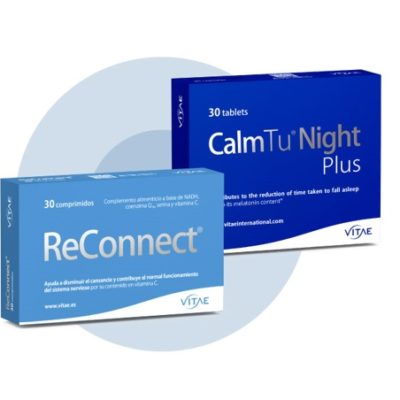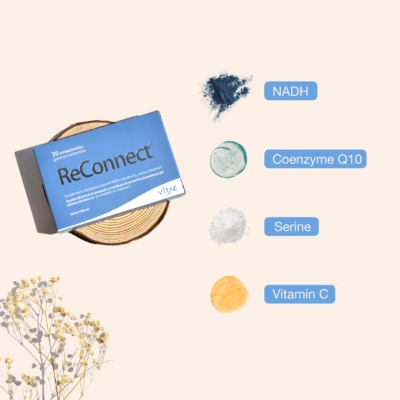Do you feel tired, unfocused, or lacking vitality? These are signs that your body and energy are out of balance. Energy is the engine that allows us to move, think, breathe, and perform each of our vital functions. But how is it generated, how is it used, and why is it so essential for physical and mental health?
The body transforms the nutrients we ingest into body energy through complex processes, where mitochondria—known as the “power plants” of cells—play a fundamental role. Without proper energy balance, fatigue, lack of physical performance, and feelings of mental exhaustion occur.
Types of energy used by the human body
When we talk about types of energy in the body, we are referring to the different ways the body obtains, stores, and uses energy to perform its functions. Bodily energy is not unique; it takes different forms depending on the activity we perform.
Metabolic energy
This is energy generated from the foods we consume (carbohydrates, fats, and proteins). These nutrients are transformed into ATP (adenosine triphosphate), the molecule that acts as our body’s “energy currency.” ATP is produced in the mitochondria and is essential for everything from moving a muscle to keeping the heart beating.
Everyday example: When you eat breakfast and then go for a walk, your body converts these nutrients into ATP to give you the energy you need to move.
Muscle energy
When we exercise or even maintain posture, our muscles require large amounts of ATP. If the demand is very high, the body uses glycogen reserves (sugars stored in the muscles) to generate energy quickly.
Example: When climbing stairs or working out at the gym, muscle energy allows muscles to contract efficiently.
Brain energy
The brain, although it only represents 2% of body weight, consumes about 20% of the body’s total energy. Its main fuel is glucose, although in special situations (such as prolonged fasting) it can use ketone bodies. Maintaining a constant flow of energy is key to memory, concentration, and mood.
Example: when you study or work on something that requires concentration, your brain is constantly demanding energy.
How does the human body generate its energy?
For the body’s energy function to be efficient, the body transforms the food we eat into usable fuel. This process, known as energy metabolism, converts carbohydrates, fats, and proteins into ATP (adenosine triphosphate), the molecule that stores and transports energy in cells.
It all begins with the digestion of nutrients, which are broken down into simpler molecules (glucose, fatty acids, and amino acids). These molecules enter the cells and are processed in the mitochondria, where the famous Krebs cycle occurs. In this cycle, along with the oxygen we breathe, electrons are released that enable the synthesis of ATP.
The result is cellular energy ready to be used in vital functions: from moving a muscle to keeping the brain active. Without oxygen, vitamins (such as B1, B6, and B12), minerals, and enzyme cofactors, this energy production would be impossible.
In short, the right combination of nutrients, oxygen, and biochemical reactions ensures that your body has the fuel it needs to stay active, focused, and healthy.
How much energy does the human body need?
The amount of energy in individuals varies depending on multiple factors such as age, gender, height, weight, physical activity level, and metabolism. Not all bodies require the same amount of fuel: while a sedentary person needs to cover basic functions, an athlete or a very active person needs much more to sustain their performance.
On average, a sedentary adult uses around 1,600–2,000 calories per day to maintain basic bodily functions. However, a very physically active person may need to consume between 2,400–3,000 calories, and even more in cases of intense training.
In addition to activity level, factors such as muscle mass (the greater the lean mass, the greater the energy expenditure) and the thermic effect of food, that is, the energy the body uses to digest and metabolize what we eat (approximately 10% of total energy expenditure), also play a role.
The body strategically distributes this energy: the brain is the organ that consumes the most, even at rest. Although it only represents 2% of body weight, it uses approximately 20% of total energy to maintain functions such as memory, thinking, and attention. The rest goes to vital organs and, when we exert ourselves physically, to the muscles, which exponentially increase their energy consumption during activity.
Therefore, if you want to feel full of energy and, at the end of the day, feel like you’ve done everything and can still do more, we recommend following these tips:
Eat a balanced and healthy diet rich in iron.
Eat at regular times.
Sleep well.
Hydrate more.
Take supplements, which are essential to ensure that the body and brain have the nutrients to generate energy and function properly.
Why do we feel a lack of energy in the body?
A lack of energy in the body is a common symptom that can be due to multiple factors, both physical and emotional. Among the most common causes are:
Prolonged stress: When we live in a state of constant alert, the body consumes more energy resources and depletes its reserves.
Poor diet: Diets lacking in essential nutrients, vitamins, and minerals hinder proper cellular energy production.
Lack of sleep: Insufficient or poor sleep reduces regeneration capacity and affects hormonal balance, diminishing vitality.
Chronic diseases: Conditions such as hypothyroidism, diabetes, or chronic fatigue syndrome can cause a constant energy deficit.
The most common symptoms that indicate low body energy levels are:
Persistent tiredness even after resting.
Difficulty concentrating and lack of motivation.
Muscle weakness and a feeling of heaviness.
Mood swings and irritability.
How to have more energy in your daily life
If you’re wondering how to have more energy, the key is to maintain habits that promote physical and mental balance. Here are some practical tips organized by category:
Nutrition
Prioritize foods rich in magnesium (spinach, almonds), quality proteins (fish, eggs), and complex carbohydrates (oats, brown rice) to maintain a steady flow of energy.
Avoid sugar spikes that cause energy crashes.
Sleep
Get 7 to 8 hours of sleep daily in a dark, quiet environment.
Create relaxing bedtime routines to improve the quality of your rest.
Hydration
Drink at least 1.5 to 2 liters of water a day. Even mild dehydration can cause fatigue and lack of concentration.
Movement
Engage in moderate physical activity such as walking, yoga, or stretching. Exercise improves circulation and cellular oxygenation.
If you spend many hours sitting, take active breaks every hour.
Supplements
Rely on supplements that support energy function.
What role does electricity play in the human body?
Electricity in the human body is essential for life. Our body generates electrical impulses that control vital functions such as:
Heart rate: The heart beats thanks to electrical impulses that mark each contraction.
Muscle contraction: Every movement depends on electrical signals that travel from the brain to the muscles.
Nerve transmission: Neurons communicate through electrical impulses that allow us to think, feel, and react.
Without this biological electricity, the body could not coordinate its functions or produce energy efficiently. It is closely related to energy function and the body’s ability to maintain cellular balance.
The Energy Function of the Human Body
The energy function consists of generating, storing, and distributing energy so that each cell fulfills its role. At the physiological level, nutrients are transformed into ATP through processes such as glycolysis and the Krebs cycle in the mitochondria.
This ATP fuels all functions:
Hormonal: regulating processes such as metabolism and stress response.
Cognitive: allowing concentration and memory to remain active.
Muscular: maintaining movement and strength.
Maintaining energy balance is essential for overall health. When this balance is disrupted, fatigue, lack of motivation, and poor physical performance occur.
Conclusion: How to Boost Energy in People
A person’s energy depends on factors such as diet, rest, hydration, and stress management. If the body doesn’t receive adequate nutrients, its ability to produce and maintain optimal energy levels decreases.
Therefore, it’s important to adopt sustainable habits: eat a balanced diet, exercise daily, sleep well, and hydrate. And when the pace of life demands it, relying on natural energy supplements can make all the difference.
Recovering your energy is possible. With healthy habits and natural support, your body can perform at its best.
Frequently asked questions about how energy works in our body
Why do I feel a lack of energy in my body, even if I eat well?
Lack of energy in the body is not always related solely to diet. Even if you eat a balanced diet, factors such as chronic stress, lack of restful sleep, vitamin and mineral deficiencies (e.g., B12, iron, or magnesium), dehydration, or even hormonal imbalances can affect your energy levels. Eating well is important, but overall balance is key.
What can I do to have more energy during the day?
If you’re wondering how to have more energy, the ideal is to combine good habits:
✔ Sleep between 7 and 8 hours a day to allow your body to recover.
✔ Hydrate properly (1.5-2 L per day).
✔ Take active breaks if you work sitting down, to stimulate circulation.
✔ Eat high-energy foods such as whole grains, nuts, and green vegetables.
✔ Rely on natural supplements that provide physical and mental energy.
What foods naturally increase body energy?
Some foods that help increase body energy are:
Banana: rich in potassium and slow-absorbing carbohydrates.
Oats: a source of sustained energy and fiber.
Nuts: loaded with magnesium and healthy fats.
Avocado: provides good fats for brain function.
Oily fish: rich in omega-3 fatty acids.
Dark chocolate: antioxidant and natural stimulant.
How does stress affect the body’s energy level?
Chronic stress is one of the main factors that decrease energy in people. It affects the nervous system, depletes nutrient reserves, and disrupts sleep and hormones. As a result, you feel more tired, irritable, and less able to concentrate.
What is the energy function of the human body?
The energy function consists of transforming the nutrients we ingest into cellular energy (ATP), necessary for all vital functions: breathing, movement, thinking, digestion, etc. This process occurs primarily in the mitochondria through metabolic pathways such as glycolysis and the Krebs cycle, which involve nutrients, oxygen, and vitamins.
What natural supplement can help me regain my energy?
At Vitae, we like to take care of you, which is why we have three supplements to help you forget about physical and mental fatigue, so you can enjoy every second of the day.
With NADH, coenzyme Q10, serine, and vitamin C, clinically tested to improve physical and cognitive performance.
✔ Increases vitality and concentration.
✔ Reduces tiredness and fatigue.
Natural multivitamin with sea buckthorn, pumpkin, and coenzyme Q10.
✔ Sustained energy throughout the day.
✔ Immune support and fatigue reduction.
Magnesium + coenzyme Q10 for muscle and energy balance.
✔ Reduces fatigue.
✔ Supports muscle function and energy production.
Reviewed by: Luisa Varela, Technical Director of Vitae Health Innovation






